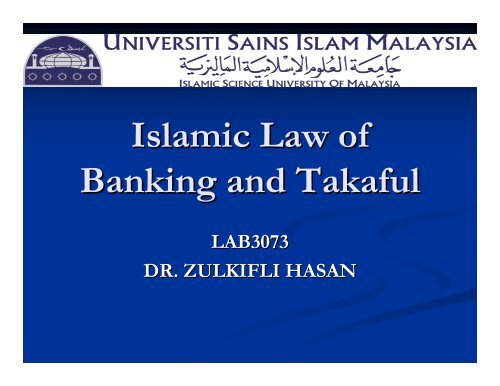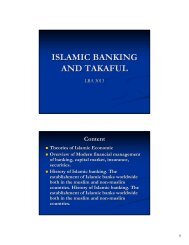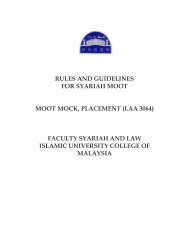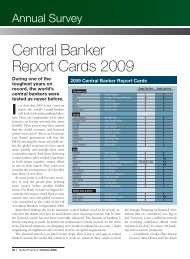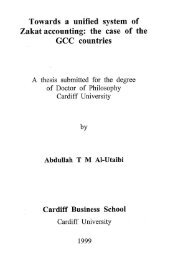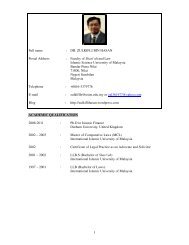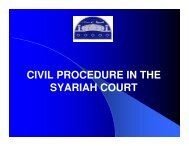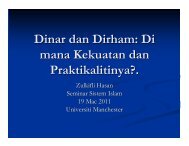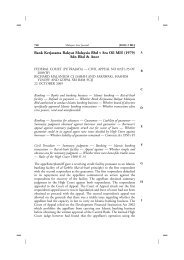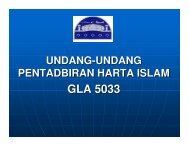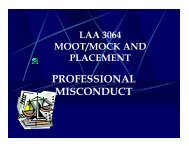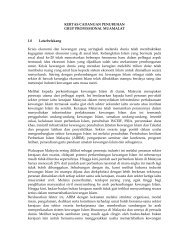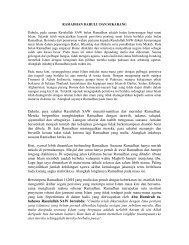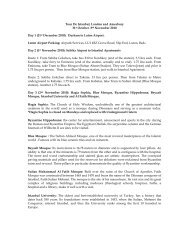Islamic Finance Cases
Islamic Finance Cases
Islamic Finance Cases
You also want an ePaper? Increase the reach of your titles
YUMPU automatically turns print PDFs into web optimized ePapers that Google loves.
<strong>Islamic</strong> Law of<br />
Banking and Takaful<br />
LAB3073<br />
DR. ZULKIFLI HASAN
Contents<br />
<strong>Islamic</strong> finance cases<br />
1987-2002<br />
2003-2007<br />
2007<br />
2008-2011<br />
2011
1987-2002<br />
<br />
<br />
<br />
<br />
<br />
Tinta Press Sdn Berhad v BIMB (1987) 1 MLJ 474; 1<br />
CLJ 474: IJarah<br />
Bank Islam Malaysia Berhad v Adnan Omar [1994] 3 CLJ<br />
735; [1994]3 AMR 44; [1994] 4 BLJ 372: BBA<br />
Dato’ Nik Mahmud Bin Daud v Bank Islam Malaysia<br />
Berhad [1996]4 MLJ 295 (BBA) Malay Reserve<br />
Bank Islam Malaysia Bhd v Shamsuddin Bin Haji Ahmad<br />
[1999] 1 LNS 275; [1999] MLJ 450 (BBA)<br />
Bank Kerjasama Rakyat Malaysia Bhd v Nesaretnam<br />
Samyveloo [2002] 8 CLJ 95; [2002] 7 MLJ 103 (BBA)
Observation<br />
The judges are more concerned on the application of<br />
classic common law approach by emphasizing the civil<br />
technical aspects and did not tackle the actual Shari’ah<br />
ah<br />
issues.<br />
In the case of Bank Islam Malaysia Berhad v Adnan Omar,<br />
the High Court held that the defendant was bound to<br />
pay the whole amount of the selling price based on the<br />
grounds that he knew the terms of the contract and<br />
knowingly entered into the agreement. In this respect,<br />
the court applied the classic common law<br />
interpretational approach where the parties are bound<br />
with the terms and conditions of the contract. The<br />
court did not look into the issue further whether BBA<br />
facility involves an element not approved by the<br />
Shari’ah<br />
ah as stipulated under the IBA and the BAFIA.
2003-2007<br />
2007<br />
Bank Kerjasama Rakyat Malaysia Berhad v Emcee Corporation<br />
Sdn. Bhd. [2003] 2 MLJ 408; 1 CLJ 625 (BBA)<br />
Bank Islam Malaysia Berhad v Pasaraya Peladang Sdn Berhad<br />
[2004] 7 MLJ 355 (BBA)<br />
Tahan Steel Corporation Sdn Bhd v Bank Islam Malaysia<br />
Berhad [2004] 6 CLJ 25; [2004] 6 MLJ 1 (istisna(<br />
istisna)<br />
Arab Malaysian Merchant Bank Berhad v Silver Concept Sdn<br />
Bhd [2005] 5 MLJ 210 (BBA)<br />
Malayan Banking Berhad v Marilyn Ho Siok Lin [2006] 7<br />
MLJ 249; 3 CLJ 796 (bba(<br />
bba)<br />
Affin Bank Berhad v Zulkifli Abdullah [2006] 3 MLJ 67<br />
(bba)<br />
Malayan Banking Berhad v Yakup bin Oje & Anor [2007] 6<br />
MLJ 398 (bba)
Arab Malaysian Merchant Bank v Silver Concept<br />
[2006] 8 CLJ 9<br />
<br />
<br />
<br />
Suriyadi Halim Omar J.–<br />
With the above mind-boggling minefield awaiting lawyers and<br />
judges alike it is small wonder that the Syariah Advisory Body<br />
has been mandated to be formulated.<br />
It is when rulings are required that the latter body must give its<br />
opinion. Under the above new s 16B of Act A1213, the Syariah<br />
Advisory Body appears to have a rather wide scope or referral,<br />
and not merely confined to the issue of whether the matter at<br />
hand involves any element which is not approved by the religion<br />
of Islam. Needless to say the final say must rest with the<br />
presiding judge (see s 16B(9)(a)).
Arab Malaysian Merchant Bank v Silver Concept<br />
(2008) 6 MLJ 295<br />
<br />
<br />
<br />
<br />
Wahab Patail J.:<br />
It was submitted for the plaintiff that the SAC had determined<br />
that the BBA complied with the Shariah and once the<br />
determination is made on the issue of Shariah compliance by the<br />
said SAC any question on their said determination can be<br />
referred to the SAC.<br />
Section 16B of the CBA 1958 however does not make reference<br />
mandatory. It clearly did not intend the SAC in the executive<br />
branch of government to be the judicial authority. Thus, its<br />
rulings are binding onlyupon the arbitrator where reference is<br />
made by an arbitrator.<br />
In the case of reference by the court, the ruling is not binding<br />
but shall be taken into consideration. Given that reference is<br />
discretionary and the rulings are not binding, and taking into<br />
consideration the issue is not as to the Shariah compliance of the<br />
ABBA facility but the interpretation of its terms, the court is of<br />
the opinion reference is not necessary.
Affin Bank Berhad v Zulkifly<br />
Abdullah [2006] 1 CLJ 438<br />
Wahab Patail J.–<br />
Since the question before the court is the interpretation<br />
and application of the terms of the contractual<br />
documents between the parties and of the decisions of<br />
the courts, reference of this case to another forum for a<br />
decision would be an indefensible abdication by this<br />
court of its function and duty to apply established<br />
principles to the question before it.<br />
It is not a question of Syariah law. It is the conclusion<br />
of this court, therefore, that there is no necessity to<br />
refer the question to another forum.
Observation<br />
In the second phase, the court indicates its<br />
interest to examine critically the underlying<br />
principles and financing facility offered by the<br />
IFIs. Unlike the earlier cases in the first phase,<br />
several judges initiated a different approach in<br />
resolving issues involving <strong>Islamic</strong> finance<br />
particularly in the case of Affin Bank Berhad v<br />
Zulkifli Abdullah and Malayan Banking Berhad v<br />
Marilyn Ho Siok Lin.<br />
This position indicates the improvement of<br />
judges’ level of awareness and understanding of<br />
<strong>Islamic</strong> finance.
Affin Bank v zulkifli Abdullah<br />
BBA 25 years PP: rm394k paid rm33k claimed by the<br />
B: rm958k<br />
Held: profit up to the date of judgment plus penalty.<br />
The learned judge indirectly criticized the attitude of<br />
early court by using narrow interpretation and heavily<br />
applying classic common law approach.<br />
The proper approach is that for the court to examine<br />
further as to the implementation of <strong>Islamic</strong> banking<br />
whether it is contrary to the religion of Islam. The<br />
courts held that <strong>Islamic</strong> contract of BBA is similar with<br />
conventional loan and hence the <strong>Islamic</strong> banks could<br />
not claim the unearned profit because it is equal with<br />
interest calculation
2008-2011<br />
2011<br />
Bank Kerjasama Rakyat Malaysia Bhd v PSC Naval<br />
Dockyard Sdn Bhd [2008] 1 CLJ 784; [2007] MLJ 722<br />
(Bai<br />
INah)<br />
Arab Malaysian <strong>Finance</strong> Bhd v Taman Ihsan Jaya Sdn Bhd<br />
& Ors (Koperasi(<br />
Seri Kota Bukit Cheraka Bhd, , third party)<br />
[2008] 5 MLJ 631; [2009] 1 CLJ 419 (BBA)<br />
Light Style Sdn Bhd v KFH Ijarah House (Malaysia) Sdn<br />
Bhd [2009] CLJ 370; [2009] 1 LNS 193 (Murabahah(<br />
Murabahah)’]<br />
Bank Islam Malaysia Bhd v Lim Kok Hoe & Anor And<br />
Other Appeals [2009] 6 CLJ 22; [2009] 6 MLJ 839<br />
(BBA)<br />
Tan Sri Khalid Ibrahim v Bank Islam Malaysia Berhad<br />
[2009] 6 MLJ 416 (bba)<br />
Bank Islam Malaysia Bhd v Azhar Osman & Other <strong>Cases</strong><br />
[2010] 5 CLJ 54 [2010] 1 LNS 251 (bba(<br />
bba)
Observation<br />
In the case of Arab Malaysian <strong>Finance</strong> Bhd v<br />
Taman Ihsan Jaya Sdn Bhd & Ors that the<br />
application of the BBA is contrary to the IBA<br />
and the BAFIA.<br />
Clearly indicates the new constructive approach<br />
of the court towards <strong>Islamic</strong> banking cases<br />
particularly in resolving issues pertaining to BBA<br />
facility. This judgment may affect the <strong>Islamic</strong><br />
financial sector in Malaysia as the expert<br />
estimates that 70 per cent of <strong>Islamic</strong> financing<br />
facility was granted under BBA facility.
Arab Malaysian <strong>Finance</strong> Bhd v<br />
Taman Ihsan Jaya Sdn Bhd & Ors<br />
The beginning of pro-active attitude of the court<br />
in examining the validity and determining issues<br />
involved in <strong>Islamic</strong> banking cases.<br />
The Federal Constitution, the IBA and the<br />
BAFIA do not provide the interpretation of<br />
which madhhab is to prevail. BBA facility must<br />
not contain any element which is not approved<br />
by the religion of Islam under the interpretation<br />
of any of the recognized maddhab.
The court accepts that BBA facility is a bona fide sale<br />
transaction and the interpretation of selling price in the<br />
case of Affin Bank Berhad v Zulkifli Abdullah was referred<br />
to where the court rejects the plaintiffs’ interpretation<br />
and applies the equitable interpretation.<br />
Where the bank recalls BBA facility at a higher price in<br />
total, the sale is not a bona fide sale but a financing<br />
transaction and rendered the facility contrary to the IBA<br />
and the BAFIA.<br />
The court holds that the plaintiffs are entitled under<br />
section 66 of the Contracts Act 1950 to return the<br />
original facility amount they had extended. It is equitable<br />
that the plaintiffs must seek to obtain price as close to<br />
the market price as possible and account for the<br />
proceeds to the respective defendants.
Case analysis<br />
In BBA facility, the court uses an equitable interpretation<br />
as to the definition of selling price whether the defendant<br />
was bound to pay the whole amount of the selling price<br />
even in the event of early termination of the contract.<br />
The classic common law approach will require the<br />
defendants to pay the whole amount of the selling price as<br />
they are bound by the terms of the contract but the court<br />
in this case chooses to apply an equitable principle.<br />
An equitable interpretation of the selling price removes<br />
the excessive amount of profit derived from BBA<br />
transaction and therefore the defendants will only have to<br />
pay the principal sum of the facility.
Profit portion of BBA facility is unlawful and<br />
contrary to the religion of Islam<br />
1. The court considers deferred payment of the<br />
selling price is a credit or a loan and any profit<br />
claimed or charged by the bank as an additional<br />
to the facility amount is interest. The court<br />
signifies that the profit derived from BBA<br />
facility is lawful if the transaction is considered<br />
as a bona fide sale. Nevertheless, BBA facility in<br />
this case abandon the element of bona fide sale<br />
in which making the profit derived from it<br />
would be prohibited as riba
2. In addition, the court also mentions that<br />
excessive selling price under BBA facility<br />
imposed a heavier burden upon the defendants<br />
that would be contrary to the intent and purpose<br />
of verses 275-280 280 of surah al-Baqarah<br />
Baqarah. . Al-Ghazali<br />
insists the practice of ihsan or doing good deeds<br />
in business rather than merely advocating the<br />
maximization of profit. The element of<br />
tolerance and benevolence should be the basis<br />
upon which the <strong>Islamic</strong> banking business<br />
transactions are conducted.
3. the issue of iwad in BBA transaction.<br />
Although the court in the current case does not<br />
mention anywhere this specific issue, it is<br />
observed that BBA facility has apparently<br />
neglected the requirement of iwad (equal counter<br />
value or compensation) where the obligation of<br />
warranty to the properties sold has been shifted<br />
to the vendor and not the plaintiffs as the<br />
sellers. Moreover, it is evident in most of BBA<br />
legal documentations that the bank holds no<br />
liability arising from all defective assets sold.
4. The true nature of contracts and transactions is<br />
the substance and not the words and the<br />
structure. The distinction between a sale and a<br />
loan is not maintained in its form alone but it<br />
must also be maintained in substance.<br />
The court opines that BBA facility may be<br />
classified as pretence of sale transaction unless<br />
there was a novation agreement to make the bank<br />
a genuine seller.
5. In interpreting the requirement under the IBA<br />
and the BAFIA that the financing facilities<br />
offered do not involve any element not<br />
approved by the religion of Islam, the court<br />
declares that the facility must not contain any<br />
element not approved by any of the recognized<br />
madhab unless the financing agreement states the<br />
specific to a particular madhhab.<br />
Since Bay al-Inah<br />
concept is only acceptable in<br />
madhhab Shafi’i, , it fails to meet the IBA and the<br />
BAFIA’s requirement and renders the<br />
transaction null and void.
Bank Islam Malaysia Berhad v. Lim Kok Hoe<br />
and Anor and Other Appeals [2009] 6 CLJ 22<br />
<br />
<br />
<br />
<br />
Raus Sharif JCA:<br />
The court will have to assume that the Syariah advisory body of<br />
the individual bank and now the Syariah Advisory Council under<br />
the aegis of Bank Negara Malaysia, would have discharge their<br />
statutory duty to ensure that the operation of the <strong>Islamic</strong> banks<br />
are within the ambit of the Religion of Islam.<br />
This is more so, when the customers in these appeals have not<br />
made any allegations that the Syariah Advisory Body of BIMB or<br />
the Syariah Advisory Council established by the Bank Negara<br />
had failed to exercise their statutory duties.<br />
Thus, the learned judge, with respect, should not have taken<br />
upon himself to rule that the BBA contracts were contrary to the<br />
Religion of Islam without having any regard to the resolutions of<br />
the Syariah Advisory Council of the Central Bank Malaysia and<br />
the Syariah Advisory body of BIMB on the validity of BBA<br />
contracts.
Tan Sri Khalid Ibrahim v. Bank Islam<br />
Malaysia Berhad<br />
<br />
<br />
<br />
<br />
<br />
Rohana Yusof J.:<br />
Having examined the SAC, its role and functions in the area of<br />
<strong>Islamic</strong> Banking, I do not see the need for me to refer this issue<br />
elsewhere though I am mindful that under s. 16B(7) I am not bound<br />
by its decision. From its constituents in s. 16B(2) the members are<br />
made of people of varied disciplines besides Shariah scholars.<br />
This, I believe will enable the body to arrive at a well informed<br />
decision instead of deciding the Shariah issue in isolation.<br />
Bearing in mind the response from the SAC to this case, namely,<br />
that BBA is a recognized form of transaction and is within Shariah, I<br />
have no hesitation to accept that view and will not venture any<br />
further into its finding.<br />
In addition to that, I hold the view that since there are differences in<br />
Shariah views, parties may generally entered into an agreement<br />
basing on any particular view or opinion and they are bound by the<br />
contracting terms based on that particular Shariah position.
Mohd Alias Ibrahim v RHB Bank Bhd and<br />
Anor [2011] 3 MLJ 26; 4 CLJ 654<br />
Pt challenged the validity of s 56-57 57 of the CBA. Ultra<br />
vires the federal constitution.<br />
1. binds the court Usurping article 121 (1) of the FC.<br />
2. wtr the sections had in effect delegated the court<br />
power to the sac.<br />
3. making ruling binding, the parties had been deprived<br />
of their right to be heard:<br />
i. breach of constitution<br />
Ii. Breach of natural justice<br />
4. retrospective effect.
Held: Dato’ Mohamad Zawawi Salleh:<br />
1. The practice of the civil court referring<br />
question on <strong>Islamic</strong> law to <strong>Islamic</strong> authorities is<br />
not new.<br />
2. The jurisdiction falls under the civil court<br />
jurisdiction. Law relating to finance.<br />
3. No retrospective effect.
Cont…<br />
The issue of whether the facility is Shariah compliant or<br />
not is only one of the issues to be decided by the court.<br />
And although the ascertainment of <strong>Islamic</strong> law as made<br />
by the SAC will be binding on the court as per the<br />
Impugned Provisions, it will be up to the court to apply<br />
the ascertained law to the facts of the case.<br />
The court still has to decide the ultimate issues which<br />
have been pleaded. Consequently, the final decision<br />
remains with the court.
Cont…<br />
The sole purpose of establishing the SAC is to create a<br />
specialized committee in the field of <strong>Islamic</strong> banking to<br />
ascertain speedily the <strong>Islamic</strong> law on financial matters<br />
so as to command the confidence of all in terms of the<br />
sanctity, quality and consistency of the interpretation<br />
and application of Shariah principles pertaining to<br />
<strong>Islamic</strong> finance transactions before the court.<br />
The SAC cannot be said to be performing a judicial or<br />
quasi-judicial function as the process of ascertainment<br />
has no attributes of a judicial decision. Hence, this is<br />
not an attempt by the executive to take over the judicial<br />
power traditionally exercised by the courts.
Obiter<br />
To ignore the functions of the SAC is to open a<br />
flood gate for lawyers and cause a tsunami of<br />
applications to call any expert at their own<br />
interest and benefit, not only from Malaysia but<br />
also from other countries who might not be<br />
familiar with our legal system, administration of<br />
<strong>Islamic</strong> law and local conditions, just to<br />
challenge the <strong>Islamic</strong> banking transactions in<br />
this country.
Thank You<br />
Zulkifli Bin Hasan<br />
Faculty of Syariah & Law<br />
E-mail:<br />
zulkiflih@admin.kuim.edu.my<br />
E-mail:<br />
zul361977@yahoo.com.<br />
Tel. No: 06-7988455<br />
H/Phone No: 016-3379776


